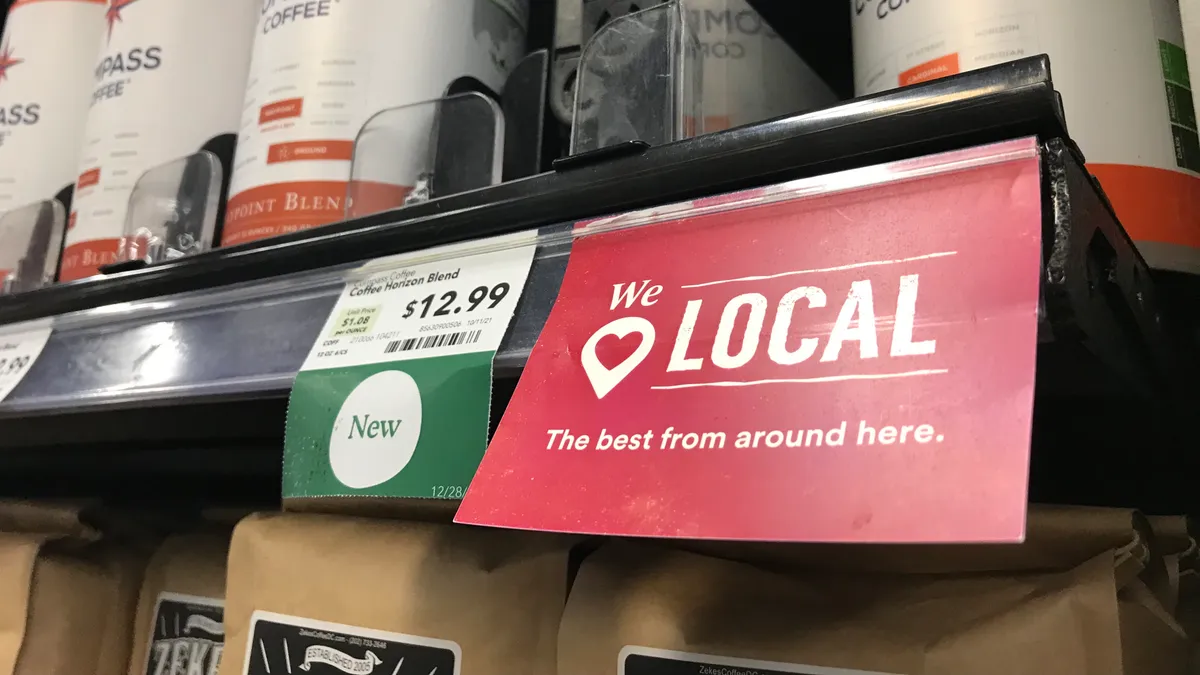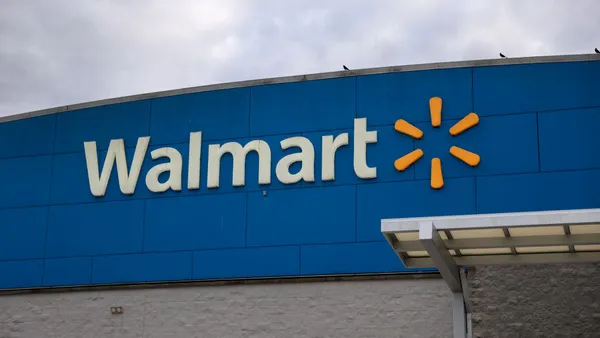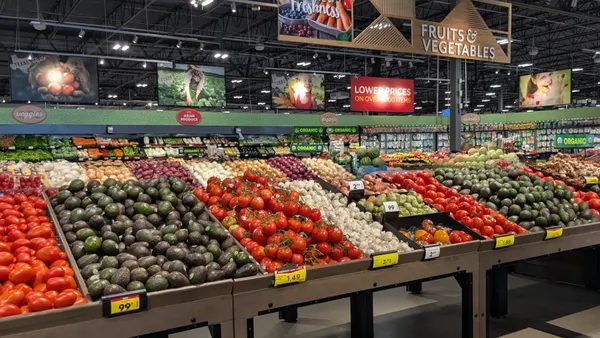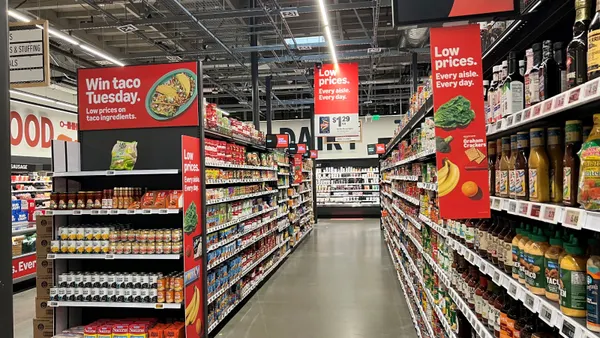Dive Brief:
- Whole Foods Market on Monday announced a mentorship and education program to provide support to local suppliers.
- The grocer started accepting applications on Tuesday for the initiative, known as the Local and Emerging Accelerator Program (LEAP), and is looking to assemble a cohort of 10 participants whose products are not yet sold in Whole Foods stores. Later this summer, the grocer plans to roll out a different cohort under LEAP that's geared toward helping existing suppliers expand, Will Betts, vice president of local merchandising and program lead for LEAP, said in an interview.
- This marks the latest steps in Whole Foods' local sourcing efforts and comes at a time when many grocers are increasingly turning to local brands and looking to boost supplier diversity.
Dive Insight:
With LEAP, Whole Foods aims to address supplier feedback that it can be difficult to get onto Whole Foods' shelves and expand geographically once they're there, Betts said.
The first cohort, called "LEAP: Early Growth," aims to offer mentorship from Whole Foods experts, education tailored to small and emerging producers and shelf placement to the selected participants in their home city's Whole Foods stores. Financial support is also on the table: Participants who complete the program have the potential to receive a $25,000 equity investment from a donor-advised fund managed by the Austin Community Foundation.
Applications for the cohort are open until April 8 and Whole Foods will announce the selected participants later this summer. Eligible categories include grocery (dry, dairy, frozen and general merchandise), wellness and beauty, prepared foods, produce, meat, seafood and specialty goods, including wine, beer and cheese.
"Ultimately, the product has to resonate with our customers, and we're really looking to elevate our local product assortment to differentiate the Whole Foods Market shopping experience," Betts said.
The participants will take part in a 10-week curriculum taught by Whole Foods experts, undergo a yearlong mentorship with a "local forager" — the grocer's title for its workers who handle local sourcing — and have access to other "growth-related supplier benefits."
Whole Foods stressed suppliers must meet its quality standards and product safety requirements before they can become available at its stores. Tools and educational material for LEAP will be housed on Whole Foods' supplier portal, allowing other suppliers to access them.
Betts said the cohort aims to "facilitate a higher level of partnership between suppliers and Whole Foods Market" and provide more knowledge on what it takes to succeed at Whole Foods. By imparting expertise in areas like finances and operations, sales, marketing, public relations and brand building and aligning with Whole Foods' strategy, Whole Foods will be able to share more with prospective brands about its intricacies and how it works.
Ultimately, it will pave the way for the Amazon-owned grocery chain to directly provide mentorship to local suppliers across the U.S. and Canada to help them be successful once they are placed in-store, Betts said.
While the first cohort is open to suppliers across the U.S. who don't work with Whole Foods already, "LEAP: On the Verge," the second cohort that is yet-to-be formally announced, will seek 10 existing suppliers from one of the chain's regions and help them expand into another region or even extend their reach globally, Betts said. Whole Foods intends to repeat both cohorts on a yearly basis, Betts added.
In announcing the LEAP program, Whole Foods highlighted that it added 500 new local brands and 6,500 new local items to shelves in 2021. "We've heard from our customers that they really like our assortment, that local resonates with them," Betts said. "And local has always been a very important part of our strategy."
Whole Foods has deep roots as a supplier of local products, though the influence of owner Amazon, which has introduced cutting-edge technology and centralized buying at the specialty chain, has overshadowed that reputation in recent years.
Now, Whole Foods is determined to show consumers it's still a champion of local. To spotlight suppliers, the grocer has used in-store call-outs through shelf-talkers, "local" tags and dedicated displays for local products, while online it has a "local" online shopping filter and included local products in its yearly report on trends. The grocer featured items like Ruby Hibiscus Water and Green Bar Distillery Lavender Bitters & Soda in its first-ever Trends Discovery Box, which debuted in October.
Sources have previously noted promoting local suppliers can also help boost brand diversity, whether minority-, women- or veteran-owned, — another key sourcing area for the grocery industry. Betts said Whole Foods sees that connection as well.
"A key tenet of the program is that our assortment reflects the communities where our stores are located, and our stores are definitely located in a very diverse set of areas across the country," Betts said. "And so we want our product mix to represent that and to represent all of our communities."











